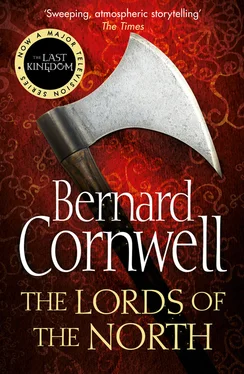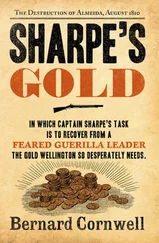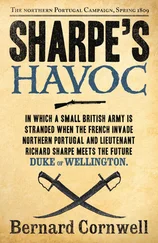Two of them were older men, perhaps in their thirties, both of them thick-bearded and wearing mail. The other four were in leather coats and were younger, just seventeen or eighteen, and the blades in their hands looked as unfamiliar to them as a plough handle would to me. They must have assumed I was a Dane because I had come from a Danish ship and they must have known that six of them could kill one Dane, but they also knew that one war-Dane, dressed in battle-splendour, was likely to kill at least two of them before he died and so they were relieved when I spoke to them in English. They were also puzzled. ‘Who are you?’ one of the older men called.
I did not answer, but just kept walking towards them. If they had decided to attack me then I would have been forced to flee ignominiously or else die, but I walked confidently, my shield held low and with Serpent-Breath’s tip brushing the long grass. They took my reluctance to answer for arrogance, when in truth it was confusion. I had thought to call myself by any name other than my own, for I did not want Kjartan or my traitorous uncle to know I had returned to Northumbria, but my name was also one to be reckoned with and I was foolishly tempted to use it to awe them, but inspiration came just in time. ‘I am Steapa of Defnascir,’ I announced, and just in case Steapa’s name was unknown in Northumbria, I added a boast. ‘I am the man who put Svein of the White Horse into his long home in the earth.’
The man who had demanded my name stepped a pace backwards. ‘You are Steapa? The one who serves Alfred?’
‘I am.’
‘Lord,’ he said, and lowered his blade. One of the younger men touched his crucifix and dropped to a knee. A third man sheathed his sword and the others, deciding that was prudent, did the same.
‘Who are you?’ I demanded.
‘We serve King Egbert,’ one of the older men said.
‘And the dead?’ I asked, gesturing towards the river where another naked corpse circled slow in the current, ‘who are they?’
‘Danes, lord.’
‘You’re killing Danes?’
‘It’s God’s will, lord,’ he said.
I gestured towards Thorkild’s ship. ‘That man is a Dane and he is also a friend. Will you kill him?’
‘We know Thorkild, lord,’ the man said, ‘and if he comes in peace he will live.’
‘And me?’ I demanded, ‘what would you do with me?’
‘The king would see you, lord. He would honour you for the great slaughter of the Danes.’
‘This slaughter?’ I asked scornfully, pointing Serpent-Breath towards a corpse floating downriver.
‘He would honour the victory over Guthrum, lord. Is it true?’
‘It is true,’ I said, ‘I was there.’ I turned then, sheathed Serpent-Breath, and beckoned to Thorkild who untied his ship and rowed it upstream. I shouted to him across the water, telling him that Egbert’s Saxons had risen against the Danes, but that these men promised they would leave him in peace if he came in friendship.
‘What would you do in my place?’ Thorkild called back. His men gave their oars small tugs to hold the ship against the river’s flow.
‘Go downstream,’ I shouted in Danish, ‘find sword-Danes and wait till you know what is happening.’
‘And you?’ he asked.
‘I stay here,’ I said.
He groped in a pouch and threw something towards me. It glittered in the fading light, then vanished among the buttercups that made the darkening pasture yellow. ‘That’s for your advice,’ he called, ‘and may you live long, whoever you are.’
He turned his ship which was a clumsy manoeuvre for the hull was almost as long as the Ouse was wide, but he managed it skilfully enough and the oars took him downstream and out of my life. I discovered later that his storehouse had been ransacked and the one-armed Dane who guarded it had been slaughtered and his daughter raped, so my advice was worth the silver coin Thorkild had thrown to me.
‘You sent him away?’ one of the bearded men asked me resentfully.
‘I told you, he was a friend.’ I stooped and found the shilling in the long grass. ‘So how do you know of Alfred’s victory?’ I asked.
‘A priest came, lord,’ he said, ‘and he told us.’
‘A priest?’
‘From Wessex, lord. All the way from Wessex. He carried a message from King Alfred.’
I should have known Alfred would want the news of his victory over Guthrum to spread throughout Saxon England, and it turned out that he had sent priests to wherever Saxons lived and those priests carried the message that Wessex was victorious and that God and his saints had given them the triumph. One such priest had been sent to King Egbert in Eoferwic, and that priest had reached the city just one day before me, and that was when the stupidity began.
The priest had travelled on horseback, his clerical frock wrapped in a bundle on the back of his saddle, and he had ridden from Saxon house to Saxon house through Danish-held Mercia. The Mercian Saxons had helped him on his way, providing fresh horses each day and escorting him past the larger Danish garrisons until he had come to Northumbria’s capital to give King Egbert the good news that the West Saxons had defeated the Great Army of the Danes. Yet what appealed even more to the Northumbrian Saxons was the outrageous claim that Saint Cuthbert had appeared to Alfred in a dream and shown him how to gain the victory. The dream was supposed to have come to Alfred during the winter of defeat in Æthelingæg where a handful of fugitive Saxons hid from the conquering Danes, and the story of the dream was aimed at Egbert’s Saxons like a huntsman’s arrow, for there was no saint more revered north of the Humber than Cuthbert. Cuthbert was Northumbria’s idol, the holiest Christian ever to live in the land, and there was not one pious Saxon household that did not pray to him daily. The idea that the north’s own glorious saint had helped Wessex defeat the Danes drove the wits from King Egbert’s skull like partridges fleeing the reapers. He had every right to be pleased at Alfred’s victory, and he doubtless resented ruling on a Danish leash, but what he should have done was thank the priest who brought the news and then, to keep him quiet, shut him up like a dog in a kennel. Instead he had ordered Wulfhere, the city’s archbishop, to hold a service of thanks in the city’s largest church. Wulfhere, who was no fool, had immediately developed an ague and ridden into the country to recover, but a fool called Father Hrothweard took his place and Eoferwic’s big church had resounded to a fiery sermon which claimed Saint Cuthbert had come from heaven to lead the West Saxons to victory, and that idiotic tale had persuaded Eoferwic’s Saxons that God and Saint Cuthbert were about to deliver their own country from the Danes. And so the killing had started.
All this I learned as we went into the city. I learned too that there had been less than a hundred Danish warriors in Eoferwic because the rest had marched north under Earl Ivarr to confront a Scottish army that had crossed the border. There had been no such invasion in living memory, but the southern Scots had a new king who had sworn to make Eoferwic his new capital, and so Ivarr had taken his army north to teach the fellow a lesson.
Ivarr was the true ruler of southern Northumbria. If he had wanted to call himself the king then there was no one to stop him, but it was convenient to have a pliable Saxon on the throne to collect the taxes and to keep his fellow-Saxons quiet. Ivarr, meanwhile, could do what his family did best; make war. He was a Lothbrok and it was their boast that no male Lothbrok had ever died in bed. They died fighting with their swords in their hands. Ivarr’s father and one uncle had died in Ireland, while Ubba, the third Lothbrok brother, had fallen to my sword at Cynuit. Now Ivarr, the latest sword-Dane from a war-besotted family, was marching against the Scots and had sworn to bring their king to Eoferwic in slave manacles.
Читать дальше












